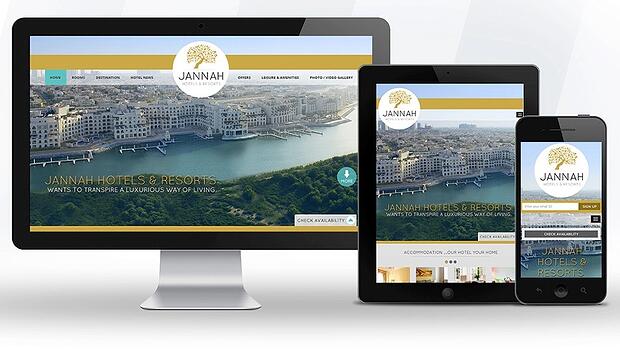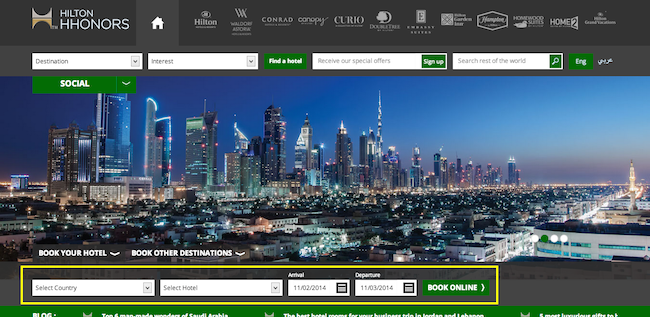
As we start the new year, all businesses should consider the effect their marketing initiatives will have on their business. It is essential for the travel industry to have marketing tactics in place to ensure their continued success. Digital marketing experts are here to help you create these strategies and help you reach your desired audience, with the right message, at the right time. Digital marketing has become a primary part of marketing, with growing complexities and technicalities involved and to ensure you aren't missing out on the opportunities this medium presents, consider these effective tips. The team at NEXA has over a decade of online marketing experience in the travel industry. We have advised large international hotel groups including Hilton, Starwood, Movenpick, Marriott and Accor, as well as hundreds of boutique hotels. We provide them with the keys to unlock revenue from digital marketing.
1. Your Website is the Foundation
Whether you are a travel agency looking to generate more inbound leads or a hotel wanting to reduce the burden of commission payments to Online Travel Agencies (OTAs), the most important place to start is your website. Much of online marketing is about driving new and targeted traffic to your business in order for travellers to become acquainted with your business and your offering.
Therefore, it is absolutely vital that when a potential customer visits your website, you create a positive first impression. Today’s online audience has less and less patience when browsing the web. More often than not, if a website takes too long to load, or the content contained within it is confusing and unclear, the power of the “back button” comes into effect.
To reduce the impact of this, the following tips should be considered:
- If your website uses large images and takes a long time to load, reduce the impact of this by reducing the file size of all images to fit your website. A good tool that you can use to check how your website rates is provided by Google called PageSpeed Insights.

- Is your website mobile friendly? The majority of travelers use their mobile devices to search for hotels or tourist attractions and Ian increasing number are making bookings on mobile devices too. Mobile phone usage coupled with technology advancements mean that less people are travelling with laptops and instead are relying on smartphones and tablets to stay in contact with their offices or family. Most websites that are not designed for mobile, generally do not display well on these devices. In worse cases, they often appear as a blank screen when your website was built using outdated technology such as Flash. Remember, smartphones have become travel accessories, there to help people find, navigate, book and share their experiences.

- Calls to action are vital. Most website visitors who engage with your website want to interact with your site. If you are a hotel or travel agency, this could mean adding a ‘Book Now’ or ‘Search for Packages’ section on your website - and social media platforms. Making these sections very visible to website visitors can often make the difference between the success and failure of a website. In simple terms, this can be the factor that stops a visitor from turning into a customer. Even if your website doesn't have a searchable booking engine, items such as a ‘Send Enquiry’ box or a telephone number should appear prominently. Remember, these should be visible on every page of your website and not just the home page!

2. Ensure Your Website can be Found
When was the last time you went onto pages 2 or 3 of Google in order to find a product or service that you were looking for? Most people don't and the reality is that 54% of clicks on a Google search engine results page go to those websites that are in positions 1, 2 and 3 on the first page. This means that most websites are invisible from general search queries on Google.

Can your business afford not to be found?
Fortunately, there is a science to how websites are ranked and understood by Google and the tips below will help your website organically rank better through Search Engine Optimisation:
- Make sure you have good quality content on your website that contain relevant keywords. Google’s robots will read all of your text so it’s important that this type of rich content is available.
- Make sure your website loads quickly. Google also uses your website’s loading speed and a ranking factor, so please make sure that your site speed is optimized.
- Make sure your headers are marked as headers! Google reads web pages in the same way that you would read a newspaper or magazine. Therefore, each web page should have a header, possible subheaders and content below these, much like how a traditional newspaper article is laid out. By understanding the title, Google then provides greater emphasis on your webpage. This in turn will help that page rank better. A good tool that you can use to see if your website’s headers are correctly marked is Woorank.
Remember, you should repeat this process for each page of your website!
3. Utilise Social Media for Reach
With the flurry of content available online, there is no excuse for a business within the tourism industry not to have social media marketing in place. Platforms such as Facebook, Twitter, LinkedIn, Instagram and Twitter provide your business with access to billions of people worldwide, who you can connect with by sharing aspirational snippets.
These platforms have a lot of information about each user, allowing you to target audiences specifically. Everything from contact details to interests, personal details and demographics make it easier for you to reach the right people. Your business will be able to showcase your brand, offers and content using a social media marketing strategy. This is imperative as it requires the creation of content, as well as community management in order to be successful.
An integrated and well-thought-out social media strategy takes into account things like:
- Who your targeted audience is
- What platforms are they likely to be on
- How can you target them
- What type of content will appeal to them the most
- How can you convert that interest into a paying customer
Marketers often say that most consumers need to see your business a minimum of 7 times before they convert to being a customer. That’s 7 different touchpoints, which for some businesses isn’t realistic given the time and investment required for this.
Social media as a mechanism can help to break these different touchpoints down and increase your business’ visibility at an extremely cost-effective rate of investment. Unlocking the potential from social media is an in-depth task but extremely doable - and effective. The return on investment can be huge, without including the benefits of additional brand visibility.
The key is in communicating effectively with your audience. Be ready to have conversations online with supportive help as well as content that inspires. For this, you'll need excellent multimedia content that tells great stories. Be creative with what you share and be sure to re-post the user-generated content that people are bound to share on their own accord.
4. Email Marketing is Your Friend
Email is not dead. In fact, quite the opposite. What’s dead is the use of unsolicited email marketing campaigns sent to those who have absolutely no interest in a product, service or business. You see, highly targeted, personal and interesting communication from a brand with whom you are aware of or have a relationship is generally welcomed with open arms. That’s why it’s important for businesses to consider creating a campaign using email not only for existing customers but also for those with who they have interacted with in the past.
The challenge most businesses face is staying visible and at the forefront of their customers’ minds. Email marketing offers this and if used properly, with best practices implemented, will be welcoming, unobtrusive and most importantly, highly effective. Most e-commerce sites will tell you that emails still provide the highest return on investment and it's therefore important for your business that you have a workable strategy in place.
Thus it remains a key part of digital marketing. The success of this depends on your database which is a rich source of data that should be fiercely guarded and expanded upon where possible. This is a way to touch base with your customers to inform them of noteworthy updates and steer them back to your website. It is also a great way to reach out for feedback after a travel experience to encourage people to leave reviews.
5. Paid marketing campaigns
Last but certainly not least, the one thing that every business should do is to engage in paid online marketing campaigns. Most businesses in the travel and hotel sectors do engage in some form of paid online advertising and speak of the effectiveness of this. But many still do not.
Paid campaigns for want of a better term, are also commonly known as PPC campaigns or search engine marketing. What these terms generally mean, are that you can use the power of technology to showcase your business to those who, at that specific moment in time, are searching for you. Search engine marketing and paid online campaigns specifically, identify user intent and place relevant adverts to help that user find the information they are looking for.
For example, if you are searching for Hotel in Singapore on Google, at the very top of the search engine results page will be a number of adverts relating to your search query. These adverts take just a few hours to create and most importantly, will only cost your business money, if a user clicks on your advert. You will not be charged if the user decides to click on another link or on a competitor’s web page. This invaluable channel means that even if your website isn’t ranking at the top of Google, you still have every chance of being visible at those times when you need to be.
So what makes Booking.com special?
Well, these types of companies take online marketing to a more advanced level. They do this by not just driving traffic to their website, but also by understanding the pages or sections of the website the users have visited. By understanding this, they can then target users with the information that is relevant to them.
Booking.com, for example, understands that I am looking for a hotel in Singapore and that I have one particular hotel in mind (I may have looked at rates for this hotel on the website). Now, as I travel through the web, Booking.com can track my activity and on websites where they have access, can show me visual advertising banners for not only Singapore as a destination, but also the specific property I was interested in. In addition, when I visit Facebook, they can also show me the same relevant information on this channel too! While some users find this intrusive, others simply may have run out of time or have been distracted, and this reminder could be timely.
This form of marketing is highly effective, yet quite easy to implement. It’s also not reserved for only large organisations. These types of campaigns can be created for businesses of any size and almost any budget.

If you'd like to know how to adjust your digital strategy to the trends I mentioned above, let's continue this conversation. Book a one-on-one session with us at NEXA and let's take your hospitality brand to the next level.
%20(1).png?width=2701&height=607&name=BRC_NEXA_LOGO_WHITE%20(2)%20(1).png)
